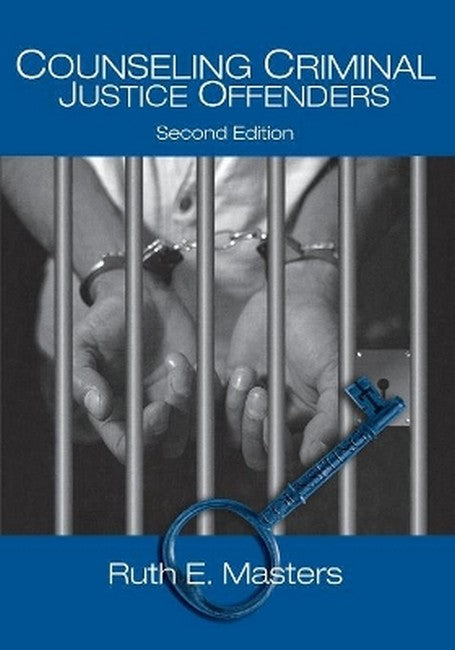Professor Ruth Masters has been teaching criminal justice counseling courses at California State University, Fresno since 1970. In addition, she has had hands-on, practical counseling experience in both adult and juvenile criminal justice systems. She has worked as a parole agent for the California Department of Corrections and the California Youth Authority. Her research can be described as a unique blending of theoretical and practical, which includes work in both corrections and law enforcement. Her textbook, Counseling Criminal Justice Offenders (1994), is published by Sage Publications. Dr. Masters is a member of American Society of Criminology; Academy of Criminal Justice Sciences; Western Society of Criminology; Women's Criminal Justice Association; California Probation, Parole and Correctional Association; and California State Juvenile Officers' Association. She received her master's degree in criminology from California State University, Fresno; and her bachelor's degree in sociology from the University of California, Berkeley.
Request Academic Copy
Please copy the ISBN for submitting review copy form
Description
Preface Contributors Chapter 1. Understanding Criminal Justice Counseling Chapter Highlights Key Terms Introduction Protection of Society Rhetoric Supervision Communication Counseling versus Therapy Roles Criminal Justice Counselors Play Criminal Justice Counseling and Burnout Ethical Considerations in Criminal Justice Counseling Summary Matching Key Terms and Definitions Discussion Questions Counselor/Offender Role-Play Scenarios Internet Sites References Suggested Readings Chapter 2. Criminal Justice Counseling Process Chapter Highlights Key Terms Introduction The Beginning of Counseling The Middle of Counseling The End of Counseling Summary Matching Key Terms and Definitions Discussion Questions Counselor/Offender Role-Play Scenarios Internet Sites References Suggested Readings Chapter 3. The Role and Importance of Emotions in Counseling Criminal Justice Offenders Chapter Highlights Key Terms Introduction Development and Structure of the Brain Definition of Emotion Core Emotions Emotional Capacity and Development Emotions, Human Empathy, and Criminality Child Abuse, the Brain, and Counseling Offenders Summary Matching Key Terms and Definitions Discussion Questions Counselor/Offender Role-Play Scenarios Internet Sites References Suggested Readings Chapter 4. Counseling and the Criminal Justice Offender Chapter Highlights Key Terms Introduction Young Offenders Adult Offenders Addicted and Substance-Abusing Offenders Disturbed Offenders Violent Offenders Female Offenders Ill Offenders Sex Offenders Resistant Offenders Incarcerated Offenders Multicultural and Ethnically Diverse Offenders Military Offenders Foreign Born Offenders Older and Elderly Offenders Mentally Retarded Offenders Summary Matching Key Terms and Definitions Discussion Questions Counselor/Offender Role-Play Scenarios Internet Sites References Suggested Readings Chapter 5. Counseling Differences in Male and Female Criminal Justice Offenders Chapter Highlights Key Terms Introduction Female and Male Communication Differences Awareness Principles for Female and Male Criminal Justice Offenders Theodora Wells' Male/Female Awareness Exercise Summary Matching Key Terms and Definitions Discussion Questions Counselor/Offender Role-Play Scenarios Internet Sites References Suggested Readings Chapter 6. Treating the Criminal Psychopath - Candice Skrapec Chapter Highlights Key Terms Introduction Treatment Outcome Summary Matching Key Terms and Definitions Discussion Questions Counselor/Offender Role-Play Scenarios Internet Sites References Chapter 7. Trauma, the Addiction Model, and Repetitive Criminal Behavior Chapter Highlights Key Terms Introduction The Brain and Obsessive-Compulsive Disorder Trauma and Post-Traumatic Stress Disorder (PTSD) The Addiction Model Treatment of Trauma and Repetitive Criminality Summary Matching Key Terms and Definitions Counselor/Offender Role-Play Scenarios Discussion Questions Internet Sites References Suggested Readings Chapter 8. Ethical and Legal Concerns in Counseling Criminal Justice Offenders - Lester P. Pincu Chapter Highlights Key Terms Introduction Ethical Concerns and Confidentiality Ethical and Legal Issues Regarding Counseling Persons with AIDS and HIV within the Criminal Justice System Legal Issues Regarding Counseling Incarcerated Offenders Summary Matching Key Terms and Definitions Discussion Questions Counselor/Offender Role-Play Scenarios Internet Sites References Suggested Readings Chapter 9. Criminal Justice Counseling Modalities Chapter Highlights Key Terms Introduction Criminal Justice Counseling Style and Technique Criminal Justice Counseling Modalities Other Approaches to Criminal Justice Counseling Summary Matching Key Terms and Definitions Discussion Questions Counselor/Offender Role-Play Scenarios Internet Sites References Suggested Readings Chapter 10. Effectiveness of Criminal Justice Counseling Chapter Highlights Key Terms Introduction Studies of Criminal Justice Counseling Effectiveness Contemporary Thoughts on What Works in Counseling Criminal Justice Offenders Contemporary Criminal Justice Treatment Outcome Investigations Summary Matching Key Terms and Definitions Discussion Questions Internet Sites Counselor/Offender Role-Play Scenarios References Suggested Readings Glossary Bibliography Index About the Authors
"Excellent book, the best I have read." -- John McCullogh

